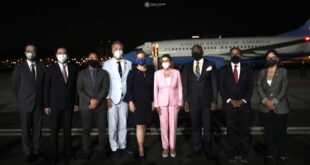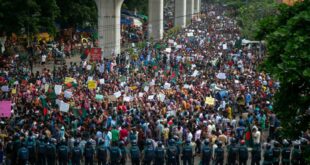Farzad Ramezani Bonesh
Senior Researcher and Analyst of International Affairs
Afghan President Mohammad Ashraf Ghani and his rival, Abdullah Abdullah, have finally signed a political agreement to form an inclusive government after months of disagreement over the outcome of the 2019 presidential election.
The agreement was signed in the presence of former President Hamid Karzai, Mohammad Karim Khalili, Rasul Sayyaf, Mohammad Younis Qanuni and former Foreign Minister Zalmai Rasoul. However, several important challenges seem to be facing the inclusive government. The following article examines these challenges.
Legal and Supervisory Challenges of the Agreement
The new agreement has not dealt with the results of last year’s presidential election. But the new agreement between Ashraf Ghani and Abdullah is very similar to the previous national unity government agreement.
Apart from the Supreme State Council (Shura-ye ‘Ali-ye Dawlat) for Political Consensus, the High Council for National Reconciliation and the presidency of the High Council for National Reconciliation are established on the basis of a political agreement between the parties. In fact, Dr. Abdullah Abdullah, as chairman of the Supreme National Reconciliation Council, is leading the peace process.
However, the differences between the leaders and the danger of the government’s lack of political unity in Kabul (as in the last six years) are among the challenges facing the government.
In fact, there is a difference in the way we look at problems such as electoral reform, the future of parliament and councils, and political change.
Therefore, it should be said that in the arena of reforms, there will certainly be disagreements in the field of elections of provincial councils and city councils, holding municipal elections, appointing a board to draft and amend the constitution, changing government structures, electoral reforms, and so on.
In addition, how to monitor and implement the agreement of the parties by the supervisory and mediation board (national and political leaders of the country) to prevent violations of the agreement and identify cases of violation of the agreement is one of the important challenges of the government.
In fact, the Board of Supervisors and Mediators on the issue of the dispute between the President and the Supreme National Reconciliation Council’s President can play an important role in reducing tensions and differences until the end of the government tenure.
However, it should be noted that this agreement has no legitimacy and validity in the country’s constitution, and the executive guarantee of this agreement has practically no legal basis and is not fully in accordance with the country’s constitution.
What is clear is that if we do not see an important decision on how to implement the agreement, it will negatively affect the security and economic situation in Afghanistan and the vicious circle of challenges in the body of the national unity government will continue.
Convincing the government supporters and critics:
In fact, the only consensual government was the only way out of the crisis and the prevention of chaos and anarchy and the bloody repetition of the experience of the devastating wars of the 1990s.
But the inability to meet the expectations of the political, ethnic, and linguistic spectrums close to the two political axes may have a negative impact on bilateral relations. This is a political challenge to the government.
That is to say, on the one hand, by signing the agreement, the opposition and the numerous and separate factions of the opposition will not gather around the axis of Reconciliation Council, and the agreement will not convince all the opposition.
Some members of the Jamiat-e-Islami party and the party’s leadership council have already backed the agreement, but some Panjshiris and northerners oppose it.
According to the announcement of the Jamiat-e-Islami of Afghanistan, it did not participate in the recent agreement with Mohammad Ashraf Ghani and considers the announced results of the 2019 presidential election to be illegal and illegitimate, in order to maintain the centralized power structure.
On the other hand, it seems that within the rich faction, such as Amrullah Saleh and Atta Mohammad Noor and some Pashtun figures, they consider the agreement as detriment to them.
What is clear is that the interpretation and reading of Ghani and Abdullah from of the challenges within the government are not the same as. The same trend will be followed by supporters and critics of both parts of the government.
On the one hand, the supporters of Abdullah’s team believe that this circulation should be involved in all levels of decision-making of the Council of Ministers, the Cabinet, the National Security Council, the Supreme Economic Council and the Committee, the country’s institutions, and so on. In addition, only parts of the agreement should not be implemented.
On the other hand, in the body of Ashraf Ghani’s team, there are and have been various challenges and attitudes towards the type of concessions assigned to the opposite faction (in cases such as the division of power, Abdullah’s authority).
Therefore, if the two leaders fail to reach a clear formula for convincing the supporters and critics of both sides of the government, the government will face more challenges. In other words, on the one hand, Ashraf Ghani must convince his accompanying figuers of how to assign concession to the rival faction.
On the other hand, Dr. Abdullah, relying on the full implementation of the agreement, demands such as amending the constitution, reforming the system, changing the structure of centralized power, and so on, should satisfy a large number of fans and followers.
Security challenges
Although the record of the Afghan army and police has been somewhat acceptable in recent years, the Taliban and terrorist groups such as ISIS are present in Afghanistan’s provinces.
At the same time, if the new leaders focus on the competing each other, rather than relying on the security of the country, Afghanistan will move towards greater insecurity and the motivation of the country’s security forces will be weakened, and even parts of the security zones will be lost.
In addition, the persistence of political challenges can reduce the percentage of recruitment to military structures and led to more troops to escape.
Peace with Taliban or inter-Afghan
Following the Taliban’s agreement with the United States in Doha, the Taliban have repeatedly accused the Afghan government of obstructing the peace process.
But after signing the agreement with Ghani, Abdullah said that he planned to immediately convene a High Council of Reconciliation and agree on a negotiating agenda, finalize a comprehensive negotiating team, finalize the venue and time of negotiations, and begin direct negotiations with the Taliban.
Government leaders seem to support the principle of dialogue with the Taliban, but there may be differences of opinion regarding the terms of the talks, maintaining new gains in Afghanistan, the democratic state of the political system, their integration into the society and the Taliban’s future role in Afghanistan.
Moreover, even if there is a full consensus in the government on how to look at the Taliban, dealing with the form of the group’s activation could cast doubt on both the outlook of the Doha agreement and also the future of talks with the Taliban.
Moreover, the Taliban favors a fragment and split in Kabul. Using a political divide between political leaders, the Taliban has dreamed of returning to the Islamic Emirate and is trying to negotiate separately with Afghan factions, teams and groups by not recognizing the government in the negotiation process.
Economic challenges facing the government
In fact, on the one hand, stability, security and economy are intertwined, and insecurity is a problem for mining, agriculture and the labor market, and will cause capital flight and the lack of interest of domestic and foreign investors in the country.
On the other hand, Afghanistan is dependent on foreign aid (about 45% of GDP) to provide security and development costs and even monthly salaries for government employees. Afghanistan is also one of the most corrupt economies in the world.
So, if the financial aid of about $ 8 billion is not supplied, security, The government’s basic infrastructure and services and Public investment will suffer. In the meantime, apart from the need for coordination between the two sides in the country’s macroeconomic approaches, the two sides must convince foreign countries to continue to help, fighting corruption and corruption.
 Geostrategic Media Political Commentary, Analysis, Security, Defense
Geostrategic Media Political Commentary, Analysis, Security, Defense





